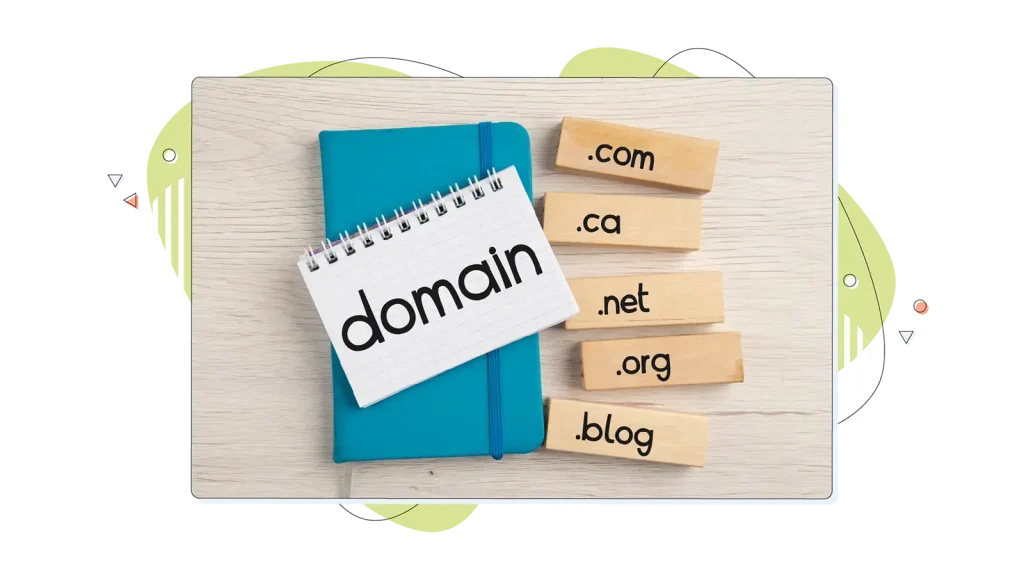The extension you choose—whether it’s one of the common domain extensions like .com, .org, .net, or something else—affects how users perceive your brand, search engine optimization (SEO), and your site’s credibility.
By popularity, the .com is the most used domain extension, with 44% of the top-level domains using it as of August 2024. It was also given its name in the period (dot-com bubble) in the late 1990s, referring to the widespread adoption of the internet and the first startups using this particular domain name.
While .com continues to dominate the domain market, a few other options have also surfaced, underscoring their importance in online branding.
Here, we’re looking at the internet’s most favourite domain name extension at a worldwide level and have gathered useful market insights to help you decide.
- What Are Domain Name Extensions?
- Top-Level Domain Name Extensions [Updated 2025]: Most Popular Domain Extension
- Domain Extension Categories
- Choosing the Right Domain Extension
- The Future of Domain Extensions

What Are Domain Name Extensions?
Domain name extensions, or Top-Level Domains (TLDs), are the letters that appear after the dot in a website’s address (like .com or .org) and are classified as top-level domains. These TLDs indicate the purpose or nature of a website, helping users understand the site’s intent at a glance. Extensions like .edu often imply education-focused content, while .gov suggests government-related information.
HostPapa’s domain search tool helps new businesses make the right choice in securing the perfect domain name for their launch.
Top-Level Domain Name Extensions [Updated 2025]: Most Popular Domain Extension
Checking the top domain extension list uncovers some useful insights that are necessary if you plan to launch your own business online.
- .com: The most popular domain extension, widely used for commercial purposes and trusted globally.
- .org: Known for its use by non-profit organizations, healthcare providers, and various online communities, the .org domain conveys trust and credibility.
- .de: This particular TLD is meant for German websites and is ideal for targeting German-speaking audiences.
- .ru: Used by Russian websites and businesses, it’s useful for companies and entrepreneurs living in the country.
- .br: Brazil’s dedicated TLD. It has gained huge traction in recent years, signalling continuous business growth in the country.
- .net: Initially intended for network services, it’s now a versatile option for technology companies and web-based services.
- .uk: The choice for United Kingdom-based entities, enhancing local trust and recognition.
- .jp: Mostly used by Japanese websites, including businesses and local institutions.
- .it: This Italian TLD occupies almost 2% of the World Wide Web and has continuously grown over the last couple of years.
- .fr: Reserved for French-speaking people, taking up almost 1.7% of all websites.
Top TLDs: Honorable Mentions
Apart from the country code TLD and the most popular domain extensions covered in this article, there are some more interesting domain names we should be covering in our article.
- .edu: Reserved for educational institutions, providing a trusted source for academic and educational content.
- .gov: Used by government entities to ensure security and authenticity in governmental communications.
- .co: Popular among startups and businesses, offering a shorter alternative to .com.
- .us: Represents the United States, ideal for businesses targeting a U.S. audience.
- .ca: Used by Canadian businesses to support local presence and engagement.
- .info: Designed for informational websites, providing a straightforward indication of content purpose.
The .com TLD is used by 44.4% of global websites, making it the most popular choice. Other TLDs also have significant market shares, contributing to the diverse landscape of global websites.
Found the domain you’re looking for? Use HostPapa’s online domain search tool to claim your next business name.

Domain Extension Categories
Getting to know the different domain extension categories can make it easier to select an extension that aligns with your website’s goals. TLDs fall into several major categories, as explained in our domains page, and each is designed with a specific purpose:
- Generic Top-Level Domains (gTLDs): Most used domains, adaptable extensions, and a good fit for a range of purposes, including business websites, blogs, eCommerce stores, etc.
- Country Code Top-Level Domains (ccTLDs): Region-specific extensions like .us, .uk, .eu, and .ca are ideal for localized content.
- Brand TLDs: Custom domains created by organizations for unique brand representation, such as .google or .apple.
Each category has its benefits, and choosing the right one can significantly impact your brand’s identity and its alignment with audience expectations. Now, let’s talk about them in more detail.
1. Generic Top-Level Domains (gTLDs)
Generic Top-Level Domains (gTLDs) are among the most popular domain extensions, as we said earlier. They’re available globally for general use and include the following:
- .com: A default choice for many businesses, .com is universally recognized and trusted. It’s often associated with commercial entities, which has made it the most popular domain extension in the world.
- .net: Initially intended for network-based organizations, .net has evolved into a general-purpose extension. Today, it’s often used by tech companies and organizations wanting a professional yet universal domain.
- .org: Traditionally associated with non-profits and community-based organizations, .org is now used more broadly. Known for conveying credibility and trust, it’s a preferred choice for charities, educational entities, as well as non-profits.
The adaptability of gTLDs makes them popular among businesses, bloggers, tech startups, and organizations that aim for a global reach. However, choosing a gTLD requires heavy thinking, as some extensions—like .com—are highly saturated.
2. Country Code Top-Level Domains (ccTLDs)
Country Code Top-Level Domains (ccTLDs) represent specific regions, like Europe or the US, while also looking to build local SEO and trust. Examples include:
- .ca (Canada)
- .us (United States)
- .eu (Europe)
- .au (Australia)
- .uk (United Kingdom)
These extensions are ideal for businesses aiming to target a local audience and work wonders for local SEO. A ccTLD signals a commitment to serving a particular region, which can increase trust with local users. For instance, a Canadian company might prefer .ca to establish a strong local presence in Canada, while an international business could use .com to indicate its availability in different parts of the world.

3. Brand and Corporate Top-Level Domains
With Brand and Corporate Top-Level Domains, businesses can create unique extensions specific to their brand. There are a few hundred domain name extensions based on popular companies and institutions like:
- Cisco
- DHL
- IBM
- Intel
These brand TLDs allow companies to reinforce their identity and create memorable web addresses. By using them, companies not only increase visibility but also fortify their brand image.
For example, a company like Amazon could use .amazon to create unique and cohesive branding across its web-based service and websites, differentiating itself from competitors. Securing a desired domain that aligns with your brand can significantly enhance your online presence and brand recognition.
4. Special-use Domain Name Extensions
However, we should also note that ICANN and IANA have created a few more special domain names, which are meant mainly for technical use. A few of these include:
- .localhost: that points to the own computer system.
- .onion: a popular domain extension for the Tor network
- .test: meant for testing DNS software
It’s worth saying that these domain names aren’t available for purchase.
5. Other Domain Name Extensions
Beyond the most widely recognized extensions like .com, .org, and ccTLDs, there are many other domain name extensions suited for specialized purposes, niche industries, and unique branding strategies. These popular extensions offer new opportunities for creative agencies, consulting firms, entertainment companies, and more, each bringing its own set of advantages.
- .info: Originally for informational sites; popular with consulting firms and fan sites for credible knowledge-sharing.
- .co: Widely recognized as a modern alternative to .com; popular among startups, creative agencies, and innovative brands.
- .biz: Commerce-focused, intended for businesses and small e-commerce sites; used by B2B services and consulting firms.
- .me: Originally Montenegro’s ccTLD, now popular for personal sites, creative agencies, and consultants seeking a human touch.
- .tv: Initially for Tuvalu, now widely used by entertainment and media companies for video content, especially on mobile devices.
- .us: Official U.S. domain, ideal for businesses, government agencies, and political parties wanting a national or local presence.
- .agency: Suited for consulting and creative firms, this TLD instantly conveys a professional or niche service orientation.
- .mobi: Made for mobile-optimized sites; great for entertainment, travel, and app-based brands prioritizing mobile users.
- .party & .fans: These niche domains, like.party, appeal to event-hosting and political groups while .fans suits fan sites and influencer communities.

Choosing the Right Domain Extension
Selecting the ideal domain extension requires a thoughtful judgment of your target audience, brand message, and the online goals of your website. Here are some important considerations:
Factors to Consider
1. Target Audience and Market
Determine whether your primary audience is global or local. For instance, if you’re targeting a U.S. audience, .us could be effective, while a global audience might resonate better with .com.
2. Brand Identity and Message
Consider the image your domain conveys. A tech company may benefit from .tech, while a blog could shine with .blog. The right extension can reinforce your brand’s mission and make your site instantly recognizable.
Non-commercial entities like charities and community organizations may benefit from an org extension, which conveys trust and reliability.
3. SEO Implications Based on Extension Choice
While Google treats most TLDs similarly, ccTLDs like .uk and .ca can influence search rankings within specific regions. Choosing a TLD that aligns with your audience’s geographic location can be advantageous in search results within that area.
Institution-Specific TLDs
Some extensions serve distinct purposes, especially for specific types of organizations:
- .edu: Reserved for educational institutions, providing a trusted source of information.
- .gov: Exclusively used by government entities, signifying authority and reliability.
Selecting a TLD that resonates with your audience and aligns with your brand’s goals can have a lasting impact on your site’s online identity and SEO performance.
The Future of Domain Extensions
As technology and user preferences continue to unfold, domain extensions will probably undergo changes to keep up with new trends and demands. Here are a few predictions for what the future of domain names might look like:
- Continued growth of niche gTLDs: Extensions like .xyz and .online will likely become even more popular as they provide more specific branding opportunities.
- Rise of internationalized domains: As more brands aim to reach international audiences, demand for internationalized TLDs with non-Latin scripts will likely increase.
- Competition for domain availability: With millions of domains registered every year, the competition for unique, memorable names is intense. Securing a relevant and recognizable domain early will become even more critical for businesses and individuals alike.
Given these changes, it’s wise to monitor domain trends and take proactive steps to protect your online identity.
Conclusion
The digital-first world we’re living in demands a domain extension you choose as a foundational element of your online brand. Whether you’re aiming for global reach with .com, building local trust with a ccTLD, or aligning with industry-specific TLDs like .shop or .tech, your domain name shapes users’ first impressions.
Carefully considering factors such as target audience, brand identity, and SEO can help you select an extension that complements your online strategy.
As more businesses and individuals enter the digital space, the competition for impactful domain names will only intensify. By selecting the right extension and adapting to emerging trends, you can strengthen your brand’s online presence and foster a credible, lasting connection with your audience.
So what are you waiting for? Claim your next business name using HostPapa’s online domain search:
Frequently Asked Questions
What is the most popular domain extension, and why is it so widely used?
The .com extension is the most popular, largely because it’s the oldest and most trusted. It has become synonymous with professionalism and credibility, making it a go-to choice for businesses and personal brands alike.
How to buy a domain name?
Usually, you obtain a domain name from the web hosting provider, getting a big bang for a buck as some web hosts will offer a domain name for free for the first year.
If you’re wondering how to get the best deal on your domain and web hosting, consider reviewing HostPapa’s web hosting services and picking your hosting solution today. Almost all our plans come with free domain registration, ensuring your website is readily available from day one.
What if my preferred domain name has already been taken?
If your preferred domain is taken, consider alternatives like adding a relevant keyword, trying a different TLD, or opting for a slight variation that maintains your brand identity. Use HostPapa’s online domain finder to help you with some excellent alternatives.
How do I choose the right domain extension for my business?
Consider your audience, brand identity, and geographic reach. If you’re aiming for global visibility, .com or .net might be suitable. For local markets, ccTLDs like .uk or .ca can build regional trust. Industry-specific extensions, like .tech for tech companies, also align well with specific audiences.
For instance, creative agencies like to use the .agency domain name as well as a few others, like .io, .ai, and .co, among others.
Do domain extensions impact SEO?
While Google doesn’t give preference to most TLDs, regional ccTLDs can impact search rankings within specific countries. Additionally, certain industry-specific TLDs, when matched with relevant content, may enhance the site’s relevance and trustworthiness in niche searches.
Are certain TLDs better for SEO than others?
Google generally treats most TLDs equally for SEO purposes. However, using a ccTLD (like .uk or .ca) may boost rankings within specific countries, while some industry-specific TLDs (.shop, .tech) may help with niche relevancy.
Can I use multiple TLDs for one brand?
Yes, many brands secure multiple TLDs (.com, .net, .co) to protect their identity, prevent brand impersonation, and cover various markets. You can direct these TLDs to your main website to capture users who might type in alternative extensions.
What are internationalized domain extensions, and who benefits from them?
Internationalized domain extensions support non-ASCII characters and allow brands to create domain names in various languages. They benefit businesses aiming to reach specific linguistic or cultural groups by providing more relevant and accessible domain names.
Are brand-specific TLDs effective for online branding?
Yes, brand-specific TLDs like .google or .apple allow companies to create memorable, branded web addresses. These TLDs can enhance brand identity, streamline customer navigation, and increase trust by reinforcing the company’s name in its domain.
Are there any risks associated with lesser-known TLDs?
Some niche TLDs are associated with spam or malware, which can lead to lower trust and even potential security concerns. To avoid this, research the TLD’s reputation and consider user trust factors in your target audience. For example, the travel and tourism industry uses travel; however, you should be wary of using such domains for other purposes.




